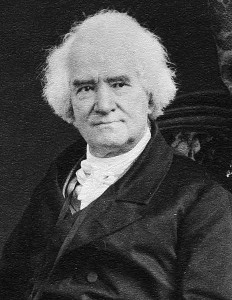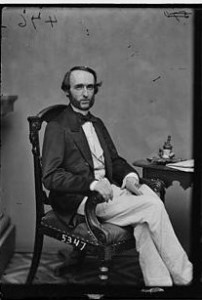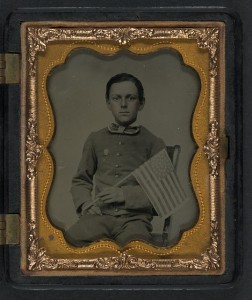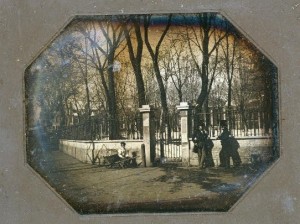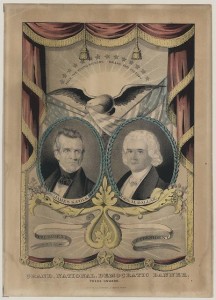From The New-York Times September 18, 1861:
ANNIVERSARY OF THE ADOPTION OF THE CONSTITUTION.
PHILADELPHIA, Tuesday, Sept. 17.
The anniversary of the adoption of the Constitution is being duly celebrated here. Salutes were fired at sunrise and at noon. The Home Guards also turned out and paraded the streets, 3,000 strong. They escorted the orator of the day, Hon. GEORGE M. DALLAS, to Independence Square, but before the procession reached that point a copious shower of rain commenced falling, without, however, affecting the precision of the military.
PHILADELPHIA, Tuesday, Sept. 17 — P.M.Notwithstanding the rain-storm, the order of exercises proceeded at Independence-square, comprising a patriotic speech by Mayor HENRY, prayer by Rev. REUBEN JEFFRIES, singing by the musical societies, and an oration by Ex-Minister DALLAS. The audience was large and enthusiastic, and after the oration and the singing of the “Star-spangled Banner,” quietly dispersed.
Oath to Support and Defend It?
From The New-York Times September 24, 1861:
No Exemption from the Oath of Allegiance.
The following correspondence explains itself:
NEW-YORK, Sent. 18, 1861.
SIR: I have the honor to address the Honorable Secretary of State to ask if the oath of allegiance is to be administered by me to adult females as well as males, and to children who may require United States passports through me; or if the sex or youth of the parties here referred to will excuse them. I have honor, Sir, to subscribe very respectfully, your obedient servant, J.B. NONES.
Hon. W.H. SEWARD, Secretary of State, Washington, D.C.
DEPARTMENT OF STATE,
WASHINGTON, Sept. 20, 1861.
To J.B. Nones, Esq., New-York:
SIR: In reply to your letter of 18th inst., I have to state that the oath of allegiance will be required of all persons to whom passports are issued. I am, Sir, your obedient servant, F.W. SEWARD,
George M. Dallas served in a variety of public offices and was James Polk’s Vice President.
Frederick W. Seward, the son of William H. Seward, served as Assistant Secretary of State under Presidents Lincoln, Andrew Johnson, and Rutherford B. Hayes. He was injured while trying to protect his father the night Lincoln was shot. His Reminiscences of a war-time statesman and diplomat, 1830-1915 was published in 1916.
Recently Seven Score and Ten published an essay by Frederick Douglass (written 150 years ago this month) in which Douglass urges the U.S. government to use its wartime powers to abolish slavery – the great mill-stone around America’s neck. The essay includes a paragraph about the how Douglass thought America should regard the Constitution during the Rebellion crisis.

